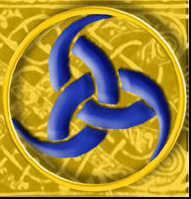
Terms of
Use
Submissions
~ Historical & Classical Poetry ~
Busla´s Curse
From the Bosasaga, Iceland 14th century
The saga tells how, impelled by untoward circumstances, young Herrauth and his companion at arms, Bósi, fight a pitched battle with Herrauth’s father, King Hring. They are subdued and bound, to be put to death on the morrow; but old Busla, Bósi’s fostermother, a hag most experienced in witchcraft, approaches the king at night “and began that curse which is since called Busla’s Curse. It has become famous. In it are many turns which are bad for Christians to have in their mouths. And this is the beginning of it:
1
“Here liest thou, Hring, Lord of the Gauts,
the most headstrong of human kind—
minded, to-morrow to murther thy son:
will this foul deed be told far and wide.
2
“Hear thou Busla’s song -’t will be sung full soon;
so that it be heard the whole world about—
harmful to him who heareth it,
but fellest for him whom fain I would curse.
3
“May wights be wildered, and wonders happen,
may cliffs be shattered and the world shaken,
may the weather worsen, and wonders happen,
but thou, King Hring, forgive Herrauth,
and eke to Bósi no ill threaten.
4
“O’er thy chest such charms now chant I shall
that evil asps shall eat thy heart,
that thy ears henceforth shall hear no more,
and thy seeing eyes leave their sockets,
but thou with Bósi wilt bear, hereafter,
nor harbor hate against Herrauth, either.
5
“If boat thou sailest, shall burst the ropes,
if boat thou steerest, shall break the tholepins7—
shall the sail-cloth be slit and sag downward,
and all the tackle be torn asunder,
but thou harbor no hate against Herrauth,
and but thou with Bósi will bear hereafter.
6
“Shall the reins ravel when thou ridest forth,
shall horses go halt, and nags be hamstrung8—
shall both highways and bridle-paths
take thee where trolls may tear thee straightway,
but thou with Bósi wilt bear hereafter,
nor harbor hate against Herrauth, either.
7
“May thy bed be for thee like burning straw,
thy high-seat unsteady like heaving sea-wave.
Yet woe awaits thee much worse by far:
if with maid thou meanest a man’s joy to have,
shalt lose thy way then:9 doest wish to hear more?”
(The king attempts to silence her and to rise, but finds himself charmed fast to his bed and unable to wake his attendants. As he is still unwilling to give in, Busla chants the second part of her curse:)
8
“Shall trolls and elves and tricking witches,
shall dwarfs and etins burn down thy mead-hall—
shall thurses hate thee and horses ride thee,
shall all straws stick thee, all storms stun thee:
and woe worth thee but my will thou doest!”
(Then the king is ready to pardon his son Herrauth, but to declare Bósi
outlaw.) Then started she to chant what is called Syrpuvers (i.e., “the Verses
of Syrpa”), in which is the strongest magic, so that it is not permitted to
chant them after nightfall; and toward the end it goes like this:
9
Come here six fellows: say thou their names:
I shall show them to thee unshackled all.
But thou get them guessed as good meseemeth,
shall ravening hounds rive thee to pieces,
and thy soul sink to hell-fire!”
(Then, after the king’s swearing an oath that he will do her bidding, she “takes the curse off.”)